- Home
- Ashley Poston
We Own the Night Page 11
We Own the Night Read online
Page 11
“Bless—Billie? What are you doing to your hair? And you’re . . . sweating.”
The worried look on his face melts into a grin. “Oh, yeah. Uh, my mom wanted to try something new. Plastic caps are all the rage these days.” That Golden Boy smile crosses his lips. Wide, honest. Why does my head seem to go gooey every time he smiles like that now? “You look like you’re late to something.”
“I—ah—no I was just, uh, walking. What are you doing on this side of town?”
He ignores the question. “Need a ride?”
I quickly look away. “Um, I think I’m good. I’m just, you know, walking.”
“Need some company, then?”
“Nah, I bet you have stuff to do.”
“C’monnnnnn North, I’m out here in a dying cap in the middle of the night. I have nothing to do,” he replies, and then begins to grin coyly. “You do have a secret boyfriend, don’t you? Gonna go meet him and kiss under the radio tower?”
I laugh. “I’m just walking! Is it a crime to walk? It’s a pretty night for a walk.” And to be late to my radio show. My radio show. The host is never late to her own show!
“You said walk three times in one breath. You’re hiding something. What are you hiding?” He begins to waddle-walk his bike beside me.
The headlight lights the street all the way to my destination. It looks so far away, and yet it’s so close.
Blocked by one Billie Bleaker.
Mick once asked me why I never told my friends about my radio show. There really isn’t a simple answer. I guess I can chalk it up to being selfish, but that’s not the whole truth. The truth of it is I don’t have to pretend to be anyone on the radio. I’m just myself, completely myself. Not living up to standards. Not fitting myself into a mold. I have no history over the airwaves, nothing that confines me, nothing that keeps me here. And that’s sort of sacred to me, that secret. I’m not Ingrid North, the DUFF of her beautiful friends. I’m not Ingrid North whose mom abandoned her when she was seven. I’m not Ingrid North, the sole guardian of her grandmother, now floating away.
I’m Niteowl, and no matter how close my real friends are, I don’t think I can ever expose the parts of me to them that are so easily heard on air. And I want to keep it that way. It’s easier.
Simple.
But this—losing Billie before I miss my show—is not simple.
Billie studies me for a long moment. “It’s not really a guy, is it?”
“Maybe it is,” I reply airily.
“You’d have told me.”
“Would I, though?” It’s a terrible comeback, but it does exactly what I need it to.
His face closes, so very suddenly, like a Venus flytrap. He quickly looks down at the ground. “Sorry, yeah. You’re right. Coming to Den’s tomorrow?” He doesn’t sound angry, just letdown. Hey, if he’s disappointed, then he should just get in line behind Micah.
“I’ll see you there,” I reply.
He kicks the clutch, and his bike roars to life. I don’t go into a full-tilt run until he turns down Corley Street, but then you better believe I make a break for the radio station like the hounds of hell are on my heels. I’m late. And you know what that means?
Mick’s doing my show.
Chapter Nineteen
“GET OUT OF MY CHAIR!”
I bang on the Plexiglas window to the studio, rounding to the door. The LIVE light glows ominously, as if it knows exactly what shade of furious I am. Mick looks up from the microphone, startled.
“Yo, girl!” he greets as I throw open the door. “I was just holding down the fort until—”
“Out, out!” I'm trying not to yell. Everyone who’s listening can hear what's going on, so I lean over and hit the OFF switch on the microphone before they can listen to any more of the catastrophe. Then I sling the roller chair away, with Mick in it, toward the other side of the studio, away from my precious radio show. I’m shaking, pretty visibly. I raise one clenched fist toward him.
“I’m going to murder you!” I cry.
Mick gives me a look like a deer caught in headlights. “I was just filling in . . .”
“I don’t care!”
“Why’re you so mad?”
“Mad?” I scoff, throwing my hands into the air. “You think I’m mad! You practically told everyone I needed to Jenny Craig myself! It’s none of their business!”
He stands, as if being a head taller will bring this fight in his favor. It won’t. “I said you are beautiful just the way you are, and I stand by that.”
I grit my teeth. “You don’t get it.”
“What don’t I get, Ingrid?” he asks in that calm I'm-A-Responsible-Adult-Who-Wants-To-Help-You voice, and puts his hands on his hips like all those condescending teachers at school. It’s the movement right before they scold you. Never scolding the person who calls you Chub-a-lub. Nor the person who writes Fat Amy Jr. on your locker. Or the kid who trumpets about your thunder thighs or asks you if your arm flab can help you fly. Or the person who calls you all the names of cattle and drops jars of gumdrops on the floor for you to clean up. It’s the stance of people who want to care but don’t understand how to.
“You shouldn’t hide who you are, girl,” he chides.
I cross my arms over my chest. “You don’t understand.”
“Then explain it to me,” Mick says, ’cause I’m just an old geezer who don’t understand nothing.”
“First thing you got right tonight!” I snap. The edges of my voice wobble. This is the one conversation I don’t want to have. It’s the reason I’ll never get that internship. It’s the reason my college reapplication is sitting on the counter. It’s the reason Mom never takes me with her on her whirlwind adventures.
I grit my teeth and look down at my dirty Chucks. “My radio show is the only place I can be myself, where people don’t have to judge me, and now they can. Oh, she’s fat, so she has to be funny. Oh, she’s a radio deejay because she can just sit there on her fat ass. Oh, no wonder she’s never been in love—no one wants to love her.”
“But none of that’s true,” Mick says, “and to be fair you are funny, and you give great advice. Best advice. Golden.”
I start to leave. I can’t do this, not now. But then Mick takes a hold of my arm. He stops me.
“Get out of my way, please,” I all but beg. “I don’t feel like putting on a show tonight.”
He nudges his head toward the microphone, looking a little pale. “Um . . . I think you just . . .”
To my horror, the LIVE light is still on. I thought I turned it off. Didn’t I turn it off? I feel my throat beginning to close in panic.
They heard everything. My listeners. Heard. Everything.
The phone lines begin to ring. A caller, third line, the red light flashing with the sound. Against my better judgment I move toward the microphone. Mick rolls the chair over again, and I slide into the seat.
I push up the slider to cue the caller in.
“Hello,” my voice warbles, “this is KOTN 93.5 and you’re on the air . . .”
“Glad you’re okay, Niteowl.”
My bones melt to his voice. Soft, suede. The same voice I’ve come to expect every Saturday night, the one I don’t realize I want to hear until he calls. Dark. I wanted the caller to be him so, so badly, it scares me. I don’t even know who he is, or what his name is—and I’m fairly sure he’ll never think of me the same way ever again.
I clear my throat. “Sorry you had to hear that. So go ahead and get whatever it is off your chest—”
“I’m sorry,” he starts. “And I think you’re more than just funny. You’re thoughtful. You respect everyone else’s feelings over yours, and you’re unabashedly selfless. We’ve all been so caught up with ourselves that we never thought to ask about you—how you are, if you’re okay. And I know this goes for me, but I think everyone else will agree . . . we’re here for you, Niteowl, even though we’re not there.”
As he talks, slowly, as if my world is
waking up, the other lines begin to light up with callers, one by one, their red lights flickering like fireworks.
Chapter Twenty
Grams links her arm in mine as we walk into the square. The Sunflower Festival happens every Fourth of July. It’s exactly what the name implies—a festival with lots of sunflowers. All kinds of sunflowers. Cardboard sunflowers, real sunflowers, kids made up to look like sunflowers . . . Just a lot of sunflowers all around. All the women in town have to wear these hideous homemade yellow dresses (me included, sadly), the men in dapper trousers and yellow ties and jackets. This is what happens when you live in a town that can barely fill one side of a football stadium—you get to play dress up and pretend you’re still in the ’50s.
But I can’t say I don’t love this part . . . just a little.
Over my yellow soda-fountain dress I’m wearing a cardigan with yellow duckies all over it, being a rebel the only way I know how. Grams wears the same dress she’s worn for the last twenty years. It’s bright-ass yellow with patches of sunflowers painstakingly sewed into it.
Miss Loraine at the apple-dunking booth applauds her dress. “It’s not a festival without Eula’s sunflower dress!” she says, and laughs at us. “Come over and bob for apples, Eulie!”
“Maybe later, dearie!” Grams shouts back, and then ducks her head close to me to whisper, “I hate that nickname. She knows it, too. Hasn’t forgiven me for stealing her man twenty-three years ago.”
“You didn’t, did you?”
“Heavens no! Your grandfather was enough for me to handle. I didn’t want her fuddy-duddy of a man.”
“Then why don’t you just clear things up?”
“Because life’s no fun if you never stir the pot.”
We pass the main gazebo, where Heather and her posse sit. You can’t mistake them. Flowery dresses, large-brim hats, a boy on each of their arms. They overtake the gazebo like dandelions. I don’t see Micah until we’re closer, and suddenly all I want to do is lead Grams the other way, but she already has her sights set on a stand selling sunflower seeds on the other side of the square. I wouldn’t mind, except it means we have to go through the greens around the gazebo to get there, and that’s one place I don’t want to go.
You’re getting over him. You’re over him, I keep repeating, hoping its true.
Micah catches my eye for a moment—not even that, really—before he looks away. Back to Heather. And smiles at her.
My heart falls like lead into my stomach. I’m not over him. He’s still mad about what I said the other night—and I can’t apologize for something I meant. Did that make me a bad person? I love the gang, but I also love Grams—and having to choose between two things you loved was my worst nightmare. But I don’t regret choosing Grams. I don’t regret distancing myself from school and the gang and everything else to take care of Grams. Grams would do the same for me.
“Oh, Micah sure looks dashing tonight,” Grams says to me, nodding to Micah. He hasn’t looked over again. “Why didn’t you tell me he’s dating Mayor Woodard’s daughter?”
I shrug.
“I always knew he fancied her.”
“What?” My eyebrows quirk up. “How?”
“When you get older, you can tell this sort of thing,” Grams chides. We make our way to the booth, where LD is helping her parents.
Mr. Darling gives Grams a big hug. “Mrs. North! I’m glad to see you out and about. And that dress! Always a pleasure.”
“I’m making sure none of you forget me!” she jokes, wagging a finger. “Goodness knows I will!”
“Grams . . . ,” I mutter.
“It’s no use treating me like a leper, darling,” Grams chides. “We all know what’s happening to me—and tonight, that sunflower pie is happening to me.” She points to one of the pies on the table, wrapped in cellophane. “Lorelei, sweetie, would you?” She looks up at LD.
LD smiles at her. No one has called her Lorelei in years. Not since her girl moved away and hearing her own name became too painful. “Sure thing, Mrs. North. It’s great to see you out tonight. Looking beautiful as usual.”
“Not as beautiful as you tonight,” Grams replies. “I love that hair! How’d you think an old lady would look with it?”
“I could come over and we could find out,” LD replies.
“Grams? Would you really want blue hair?” I ask. “Is it really you?”
She scoffs. “Sweetie, if I’ve learned anything, it’s that none of us have time to be anyone else.”
“It’s a date then, Mrs. North,” LD replies, and hands Grams a plastic bag with her sunflower pie. As Grams wanders away to another booth with sunflower cooking aprons, LD leans in to me and whispers, “She’s having a good night.”
“Yeah, kinda freaky. I’m just waiting for . . .”
“Don’t jinx it!” she warns. “So, I get off in about half an hour. Wanna be my partner for the hoedown later?”
“You will never catch me dancing.”
“It’s a date then!”
I say good-bye to her parents and hurry to catch up with Grams. She crooks her elbow and I intertwine my arm with hers again. We browse some of the quilts at the mayor’s wife’s booth, but we don’t buy anything even though Grams keeps eyeing a beautiful night-sky quilt for a long, long time.
“Wouldn’t that look lovely on the back of our couch? It almost matches the throw pillows,” she says, nodding like she already made up her mind. “Mrs. Woodard, how do you have time to quilt all these?”
Heather’s mother gives a modest laugh. “I’ve had so much more time for hobbies ever since Heather started taking on more secretarial work at the town office. You know Ralph works his bumpkins off. It’s nice to see Heather taking initiative.”
“It’s nice to see some jobs stay in the family,” Grams replies a little tongue in cheek.
Mrs. Woodard begins to object when Heather passes back into the booth and takes her purse out from the back, beginning to rummage around for something. “Mom, did you remember the charger? My phone’s dying again and I can’t find . . .” Heather pauses, suddenly noticing me and Gran. Her face hardens. “Oh, Ingrid.”
“Heather! You’ve grown up so much,” Grams greets her before I can say anything. “You just graduated too, didn’t you?”
“Yes ma’am,” Heather replies, turning her eyes back down to her purse.
“Going to any colleges? I hear Billie’s been accepted to Iowa! And my daughter here . . .” She hesitates, and my blood turns cold. Oh no, not now. Her eyebrows furrow and she corrects, “My granddaughter got accepted to NYU. Isn’t that right, Ingrid?”
“You did?” Heather echoes.
My mouth goes dry. “I—um—I never—”
“That’s wonderful!” Mrs. Woodard clasps her hands together happily. “But who’s going to take care of you, Eula?”
Grams scoffs. “Stop worrying about me. Heather, do you have any college plans?”
But Heather’s still staring at me like a deer in headlines. Probably wondering how NYU could accept someone like me. Well, jokes on me, isn’t it? Because I’m not going—and Grams will forget that I ever got accepted soon enough.
Finally, Heather turns away again and pulls out the charger she found in her purse. “No, ma’am. I’m staying close to home.”
“It’s not like you’ll lose your way home if you leave!” Grams says, and laughs. “You should go out, find yourself, make some mistakes.”
“Heather and everyone she loves is in Steadfast,” her mother replies, growing a little rigid around the shoulders. “Why go anywhere else?”
“Why not go anywhere else?” Grams rebukes, and then turns to Heather. “Get lost. Find new places. And when you’re done wandering, love is like the North Star. It will always guide you home.” Then, smiling, she points at the quit with the stars. “I’ll take this one. Darling? What do you think?”
I think by the way Mrs. Woodard is turning three shades of red, I think we should get out of here. I quic
kly pay for the quilt and guide Grams away. Behind us, I hear Mrs. Woodard scold Heather about not talking about the career opportunities the community of Steadfast offers. Which are plentiful, for sure, but there are only so many job positions open to the young people of Steadfast that don’t involve being a sweet assistant at Sweetey’s.
We wander the festival for a few more minutes until the mayor shoos Heather and her posse out of the gazebo so the band can start setting up.
It’s a beautiful night. Perfect for a festival. There isn’t a cloud in the sky, so all of the stars shine down like laser beams of light, the tops of the houses in the square bathed in silver moonlight. And above us all, hanging like theNorth Star, is the blinking red radio tower. Home. I stare up at it, wondering what Steadfast looks like from way up there. Maybe just a toy town, more yellow than usual. Or maybe we all look like little ants running around. Maybe we don’t look like people at all.
Or maybe, from up there, Billie’s right. You can see the whole picture, how small everything is, how inconsequential. From up there, I’m sure you can see Steadfast, but also the abandoned maze beyond, and beyond that the red doors of the Barn, and beyond that the reservoir, as the land stretches farther and farther into the darkness. From up there, I’m sure everything looks like nothing.
Chapter Twenty-One
“It’s pretty, isn’t it?” a voice asks beside me.
I jump, but it’s only Billie. He has his hands in his pockets, a yellow button-down stretched over his broad shoulders, and a black tie. And pink hair. Like pastel pink. Cotton candy, the kind you buy at the fair that tastes like it was pooped out of a unicorn.
“Oh bless,” I mutter.
He rubs the back of his neck bashfully. “Don’t get too used to it.”
“What—how—did your mom . . .”
“I, er, I sort of left the dye in too long.”
“Left the . . .” I begin to repeat, and then realize how that happened. “Oh my God, when I saw you Saturday?”
“It’s ridiculous, and I’ve gotten shit all night from it,” he adds, jutting his chin toward his former football team at the gazebo, all paired off in yellow dresses and clean button-down shirts. Mike glances over and sneers at us, and I quickly look away.

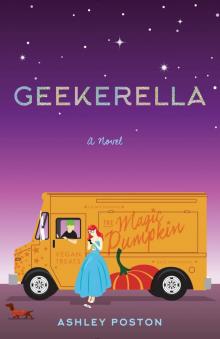 Geekerella
Geekerella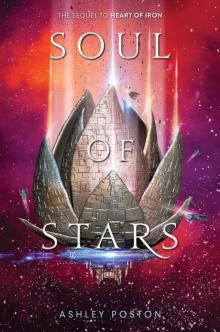 Soul of Stars
Soul of Stars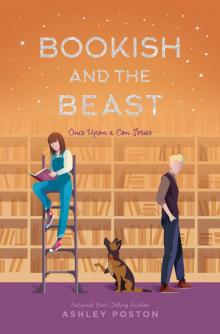 Bookish and the Beast
Bookish and the Beast The Sound of Us
The Sound of Us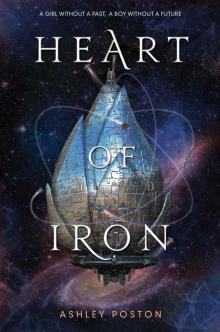 Heart of Iron
Heart of Iron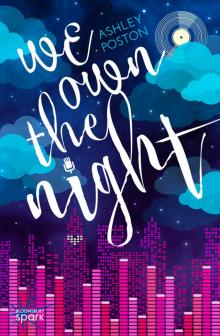 We Own the Night
We Own the Night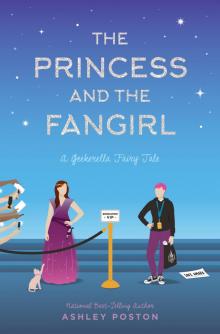 The Princess and the Fangirl
The Princess and the Fangirl